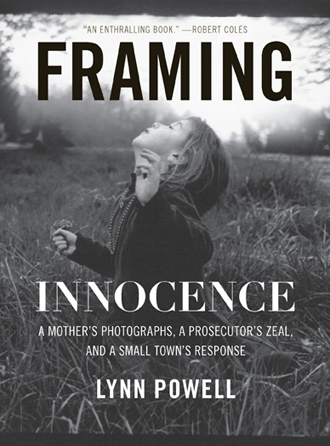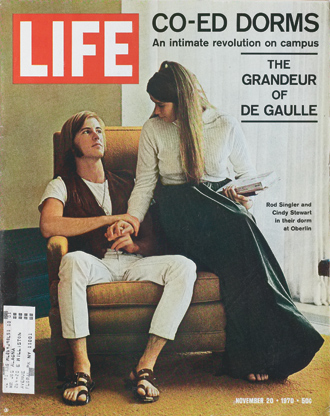Oberlin Alumni Magazine
Winter 2010-11 Vol. 106 No. 1
Intimate Revolutions

Lynn Powell tells the story behind her new book
Framing Innocence
In 1970, Oberlin first-year student Cynthia Stewart appeared on the cover of Life magazine highlighting its article on co-ed dormitory life, then a new phenomenon on college campuses. Being the cover girl for what Life called an "intimate revolution in campus life" catapulted Cynthia into iconic status for a generation of Obies.
Thirty years later, another set of photographs catapulted Cynthia into a legal nightmare. My new nonfiction book, Framing Innocence: A Mother’s Photographs, A Prosecutor’s Zeal, and A Small Town’s Response, chronicles the events that threatened Cynthia’s family and stirred the Oberlin community to action in 1999 and 2000.
Cynthia, who has lived in the town of Oberlin for most of her post-college life, became a passionate photographer after the birth of her daughter Nora. Within eight years, Cynthia had taken a staggering 35,000 photographs. When Cynthia shot a half-roll of 8-year-old Nora in the bathtub, including a few of her daughter rinsing with a handheld shower sprayer, it didn’t occur to her that those pictures could be mistaken for child porn. They were simply part of the vast photographic record she was keeping of her family’s life. But when a Mansfield, Ohio, film-processing lab sent those prints to the police, the county prosecutor saw a young girl performing a sexual act. That leap of prosecutorial imagination resulted in two felony charges and launched Cynthia’s family into a legal ordeal that would consume one-and-a-half years, cost $40,000, and send emotional aftershocks through their lives for a decade.
My family moved to Oberlin in 1990 for my husband to teach in the physics and astronomy department. Our son Jesse and Nora were classmates and good friends. Another Oberlin mother, Rebecca Cross ’84, and I started the Cynthia Stewart Legal Defense Fund to support Cynthia’s family as they incurred massive legal expenses. The Nation magazine and the Oberlin Alumni Magazine ran early stories about the prosecution, and contributions to the defense fund rolled in from around the country. When Lorain County Children Services subsequently alleged that Nora was an abused child and conducted what many of us in Oberlin felt was a Kafkaesque hearing, our community galvanized and confronted the prosecutor. In true Oberlin fashion, we made a public ruckus, quietly worked the back channels, garnered national media attention, and made a difference. We were a diverse group of professors, townspeople, students, alums, Republicans, and Democrats working together—improvisationally and with some surprising heroes—to ensure justice for a good family. Ultimately, the prosecutor dismissed all charges against Cynthia in exchange for six months of counseling and the destruction of two of her photographs.
A photograph Cynthia took of her young daughter graces the cover of Framing Innocence, which was published by The New Press this past September. Nora is now a sophomore at Yale University and 19 years old—the same age her mother was when she appeared on the cover of Life 40 years ago. At the launch of Framing Innocence at First Church in Oberlin, Cynthia and Nora thanked the Oberlin community for saving their family. Remembering her childhood trauma, Nora told the standing-room only crowd that her nightmares disappeared once the community rose up in public support of her mother. "I felt shielded by the strength of your indignation," Nora recalled. "And, as frightening as my daily reality was, I couldn’t imagine a fight that all of you could lose."
One of the most gratifying responses from readers of Framing Innocence has been their appreciation for the role the Oberlin community played in bringing an imperfect but humane resolution to the case—a role I hope will inspire other communities to confront injustice in their own neighborhoods. Oberlin’s history of thinking for ourselves, going against the grain, and standing up for what is right served us, and Cynthia’s family, well.
Lynn Powell is also the author of two books of poetry: Old & New Testaments and The Zones of Paradise.
Life after Life
 (photo by John Seyfried)
(photo by John Seyfried)
Robert Singler was a junior when he was featured alongside Cindy Stewart in the Life magazine story about co-ed living. He majored in biology and philosophy, graduating in 1972, and he earned his doctorate in medicine at Duke University School of Medicine in 1976.

Robert Singler
(photo by John Seyfried)
Today, Col. (Dr.) Singler is a highly decorated commander of the 349th Medical Group, one of four groups assigned to the Air Force Reserve Command’s 349th Air Mobility Wing at Travis Air Force Base in California. He was deployed in support of Operation Desert Storm in 1991 and deployed as commander at Tallil Air Base in Iraq in 2003.
In civilian life, he is a cardiac anesthesiologist for open-heart surgery at Queen of the Valley Medical Center in Napa, California.
Singler developed a lasting friendship with Stewart, and he was among the first to donate to her legal defense fund in 1999.
"When we left college, I told Cindy if there was anything she ever needed from me, don’t hesitate to call," says Singler, who is married with children. "I was very touched that she accepted my help."

Nora and Cindy Stewart
(photo by John Seyfried)
Singler says the media attention that followed the Life cover story did more harm than good in his personal life, and to some extent caused a strain on his relationship with Stewart.
"They were asking me questions that I couldn’t answer. I’ve been very suspicious of the media ever since," he says. "But, the country was ready for co-ed dorms. The time was right."
Singler joined the Air Force Reserves in 1990, just before Operation Desert Storm. He’d had 10 years of practice with surgeons who served in Vietnam, and he listened to many of their stories and admired their camaraderie.
"It really hit home, and I saw it was time to pay back," he says.
Though they appear worlds apart, Singler relishes their friendship.
"Cindy’s a great gal. She’s a lifelong friend—I suppose that’s usually true of your first love."
—Amanda Nagy
